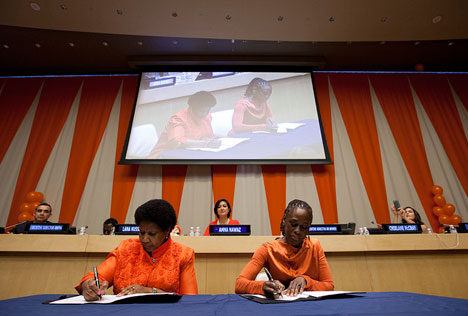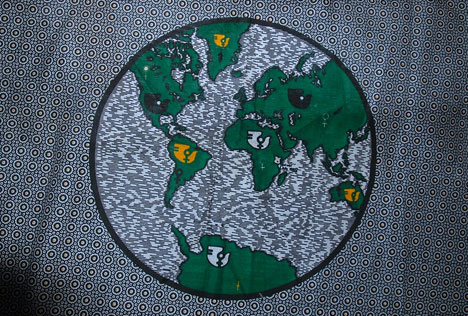Violence against women is international news. Joyti Singh Pandey was gang raped and tortured on a bus in Delhi and died a few weeks later in December 2012. Anene Booysen in South Africa was gang raped and tortured and died in South Africa in February 2013. These cases triggered mass protests domestically, linking violence against women to grotesque governance failures. The vehemence of the protests and demands for justice and social change were heard around the world.

UN Women Executive Director Phumzile Mlambo-Ngcuka and Chirlane McCray, First Lady of the City of New York, sign a memorandum of understanding to work together to enhance the safety and empowerment of women and girls. The signing took place last month, on, held each year on 25 November. Photo: UN Women. Source: Flickr
Violence against women in conflict situations from South Sudan to eastern Congo to Ukraine to the atrocities committed by ISIS, is no longer ignored as inevitable collateral damage and made invisible to history the way it has been in the past. The elimination of this violence has pride of place in the gender equality targets in the draft “Sustainable Development Goals” – the successors to the 2000-2015 Millennium Development Goals. But the violence keeps happening. Unambiguous condemnation, the formulation of new laws and international declarations, training of police and judicial personnel, coalitions of men against violence – what is missing?
Norm emergence, norm “cascade”, norm internalization
That we know the names of victims, that we have a stronger sense of the extent and patterns of violence against women, that political parties campaign on promises to stop the violence, that international peacekeepers are mandated to prevent sexual violence – these are signs of a “cascade” in national and global commitments to end this pervasive human rights abuse. International relations theorists Martha Finnemore and Kathryn Sikkink, in their study of the “life cycle” of normative shifts where issues previously considered beyond the reach of policy come centre stage, identify three stages – from norm emergence, to a norm “cascade”, to norm internalization. Sikkink and Margaret Keck, in a separate study, identify cascading national and international condemnation of violence against women as one of the most striking normative shifts of our time. But the grim fact of the ongoing violence suggests that we are stuck at the “cascade” phase of this normative shift. Something is blocking “internalization”, which would include routine and effective prevention of the violence, routine and decisive prosecutions and convictions, routine and meaningful alternatives to dependence on individual men for women everywhere.
I will discuss three reasons for this blockage here. First, the broader public condemnation of the problem has sometimes led to solutions stripped of feminist content that therefore fail to address root causes. Second, the strongest drivers of change – feminist organizations – cannot do their essential job in contexts of deepening social inequality and insecurity. Third, there has recently been an interruption of the international solidarities that can be so powerful in addressing this violence.
Feminists have always argued that violence against women is driven by profound inequalities between women and men that leave women dependent on individual men and that celebrate violent masculinities. Nothing short of dramatic social transformation to eliminate the legal, economic and political basis for cults of gender difference and male privilege will put an end to the violence. But profound social change does not sell politically and involves time horizons that go beyond the electoral cycle. So, rather than propose long-term changes in male privilege, we link the prevention of violence against women to crime reduction or to child welfare. Rather than seriously invest in demilitarization and pacifism to tackle sexual violence in warfare, we reassert that it is an illegal method of fighting and call for a military/judicial response. We focus on catching the perpetrators and stopping impunity, not on the discrimination that fosters it.
Instrumental policy arguments are unavoidable but must be developed with an eye on the longer-term social change project. Without social transformation in mind, responses are like trying to cap a gushing deep-water oil well rupture with a splash of concrete. The abuse just keeps coming.
The recent focus on male victims of domestic abuse and of war rape can have the unfortunate effect of further postponing the feminist social change project. The exposure of the ways in which men and boys also experience these types of violence (and we still do not know the full extent) has helped to attract new allies in the prevention effort. However, it has also encouraged the framing of the problem of domestic violence as simply a criminal problem – to be addressed through crime-prevention efforts. Wartime rape has been framed as an almost gender-neutral weapon of war. Taking the feminist social change project out of the definition of and the solutions to these problems makes responses patronizing and in the end, ineffective. The project becomes the protection of victims. Not changing the social relations that make this violence so powerful as a means to control women.
This brings me to the second point: the threatened future of feminist organizations in the fight against violence against women. We know that diverse and powerful women’s movements with autonomous (i.e. not controlled by the state, parties, traditional or private interests) feminist organizations are the key to stopping violence against women. Feminist organizations politicized the issue in the first place, “outing” it from a private personal shame to a serious crime requiring a public response.
Feminist organizations continue to provide shelter, legal aid and resources to build safer lives. Financial support for feminist organizations is critical. Integrating feminist organizations to public response efforts – as advisors and monitors, as suppliers of shelter services – should be a major element of national prevention efforts. But feminist organizations continue to be underfunded, and excluded from policy-making in most contexts. AWID’s decade-long research on financing women’s organizations indicates a secular decline in funding. Nowhere is financial support more desperately needed than in conflict contexts, but there, women’s organizations rarely meet the accounting standards required by external donors. In this regard the special fund set up by the Netherlands in 2013 to support women’s organization-building in the Middle East, “Women on the Frontline”, is an exception, designed not to fund a donor’s pet activities but simply to help women’s organizations build capacities to manage funds and establish a constituency.
For a constituency is what is needed – a constituency capable not just of protesting on the streets, but of backing and then holding accountable political representatives. The evaporation of women pro-democracy protesters from the Arab Spring countries to Ukraine, whether the struggle moved into parliaments or armed conflict, shows the flimsiness of the feminist constituency – at least compared with the capacity of well-organized conservative forces to seep into political vacuums.
Sustained collective action
The thing that distinguishes short-term mass action from sustained collective action to advance progressive agendas is middle class commitment and absorption into institutions like parties and trade unions. But in many countries, the middle class is shrinking because of the breakneck increase in economic inequality. Oxfam’s important January 2014 paper “Working for the few” shows that the dramatic polarization between rich and poor leaves little space in between. Political capture by elites and their capacity to flee or insulate themselves from social horrors profoundly weakens democracy as well as ideas of basic common human dignity. Grinding time and income poverty prevents women’s collective action from reaching much beyond solidarities promoting basic survival. Without the time and resources of a middle class, feminist mobilization – and the project of social change to stop violence against women – stalls.
Feminist approaches to ending violence against women have always worked from a minority position. Their challenges to male privileges trigger (sometimes violent) backlash. Their proposals to change divisions of labour and social value arouse incredulity and doctrinal objections. They lack the domestic social, physical and political capital to change majority views. It is therefore no accident that feminist approaches have gained unprecedented visibility and viability through international networking and normative debate. Beleaguered feminist leaders have been able to use international networking not just for solidarity and fundraising, but to advance international norms on women’s rights and thereby strengthen their positions in domestic policy battles.

Khanga from the 1985 UN World Conference on Women in Nairobi, Kenya. Photo: Tommy Miles. Source: Flickr
International solidarities have provided leverage for feminist groups. The most powerful mechanism for this since 1975 has been the periodic United Nations World Conferences on Women. Next year will be the twentieth anniversary of the Beijing conference and its celebrated Platform for Action. In 2011, Turkey offered to host a 20th anniversary conference – a fifth World Conference on Women – and the UN Secretary-General Ban Ki-moon asked member states to decide if they wanted to go ahead. The idea was swiftly quashed, including by the newly established UN Women. There was too great a risk, sceptics argued, that advances in women’s rights would be clawed back by increasingly conservative governments the world over. So there will be no fifth World Conference. In September next year the General Assembly will spend a day reflecting on progress since Beijing – an event guaranteed to feature sanctimonious and mendacious statements about how much individual governments are doing to improve the lives of women and girls. But that is it. Once again, the “cascade” will be checked.
Blocking a fifth World Conference on Women was a major mistake. Turkey’s generous offer would have provided the opportunity for women in Muslim countries to resist the conservative closing of ranks in the Muslim world. Social media – something that did not exist at all in Beijing and Huairou in 1995, when there were barely any Internet cafes let alone smart phones – would bring the project of feminist social change into households and offices and schoolrooms around the world – broadening the debate and exposing the hypocrisy and primitivism of governments aiming to limit women’s rights. And should consensus on a new compact for women’s rights be impossible to achieve in a world polarized on the matter of women’s rights, it would not be a disaster. It is not that we would agree to disagree. It is that our divergent positions would at last be plainly on the table – exposing a serious international relations problem that must be addressed in the foreign policies of nations committed to equality.
A fifth world conference on women’s rights would not stop violence against women. But it might help nudge the cascade in commitments to stopping violence against women from agreements on paper into preventive efforts that are more predictable, routine and normalized. It is too late for 2015. But the fight to end the most pervasive feature of gender-based inequality – violence against women – should now take up a call for a fifth World Conference on Women as soon as possible. It could trigger the move from the cascade to internalization of efforts to end the violence.
This article was originally published in 50:50’s series on 16 days: Activism against gender-based violence 2014








